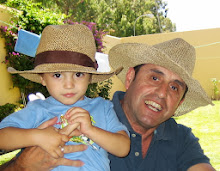 Conditional clauses are quite a difficult issue in English -they're also quite difficult to master in our own language and very often we hear people using the wrong tenses.
Conditional clauses are quite a difficult issue in English -they're also quite difficult to master in our own language and very often we hear people using the wrong tenses.
I have prepared some notes to help you get a clear idea of how conditional clauses work, the tenses we must use and the functions we can express with them.
We usually refer to Conditional clauses Type I as "Open condition" because we view the condition expressed in the if clause as something likely to happen. Ex: "If the weather is nice tomorrow, we'll go to the beach."
As you will see when you read the notes, we use this type of conditionals to express: general and particular cause-effect, advice, threat, offer, comments, etc...
Here you will find some exercises to practise Conditional clauses Type I
And yet another link dealing with grammar and exercises on Type I conditional clauses.
Good luck!
And now a little present: a beautiful poem called "If" by 1907 Literature Nobel Prize winner, Rudyard Kipling. Click here to read several translations of the poem If into Spanish; you can choose your favourite. And now, are you ready now to watch this magnificent video by George Horne? He has some excellent works, maybe you want to take a minute to see some of the things he does.
